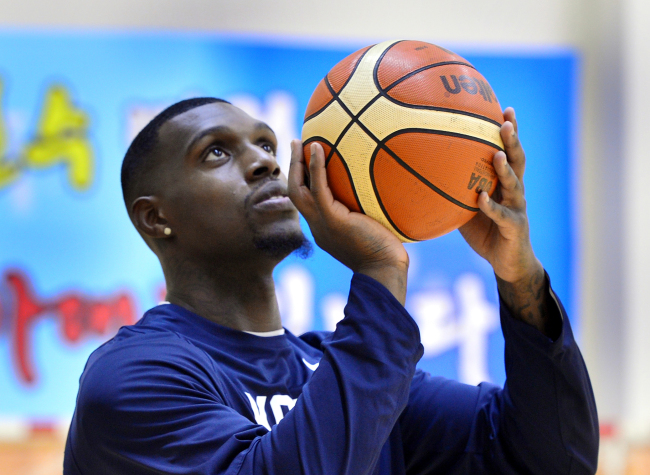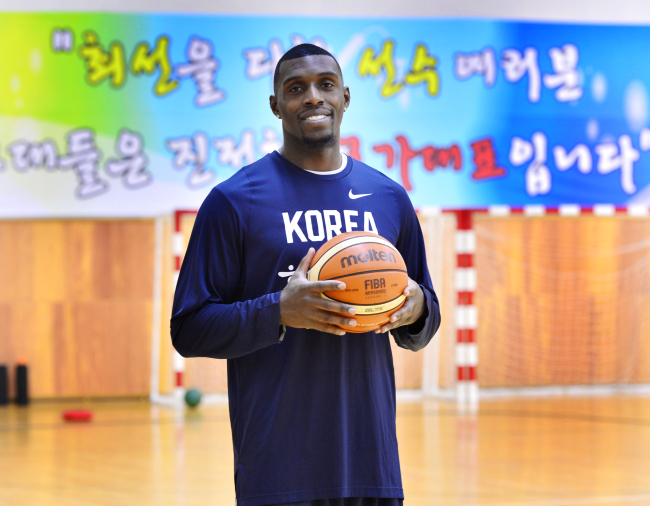First naturalized basketball player not of Korean descent strives to make lasting impact
On Thursday, South Korean basketball fans saw something they hadn’t seen in years: their team dominating the paint against the towering Chinese national team.
Ricardo Ratliffe, a recently naturalized Korean player, gave the Chinese twin towers of Wang Zhelin and Zhou Qi a run for their money as he scorched them for 25 points and 11 rebounds in an 82-74 victory in the third game of the FIBA Asian Qualifiers.
The strong inside presence of Ratliffe, or Ra Gun-ah as his new South Korean passport shows, is what helped make him the first naturalized player of non-Korean descent on the South Korean national team.
But the 199-centimeter center is trying to wrap his head around becoming Korean, which still feels as unfamiliar to him as most Koreans are with his new name.
On Thursday, South Korean basketball fans saw something they hadn’t seen in years: their team dominating the paint against the towering Chinese national team.
Ricardo Ratliffe, a recently naturalized Korean player, gave the Chinese twin towers of Wang Zhelin and Zhou Qi a run for their money as he scorched them for 25 points and 11 rebounds in an 82-74 victory in the third game of the FIBA Asian Qualifiers.
The strong inside presence of Ratliffe, or Ra Gun-ah as his new South Korean passport shows, is what helped make him the first naturalized player of non-Korean descent on the South Korean national team.
But the 199-centimeter center is trying to wrap his head around becoming Korean, which still feels as unfamiliar to him as most Koreans are with his new name.

“Mostly Koreans just call me Rhee (from Ricardo). Ricky was like my nickname growing up, but here everybody just calls me Rhee,” he said.
From Ratliffe to Ra Gun-ah
For those who have known him as Ratliffe, a burly center who has dominated the Korean Basketball League the past six years, it still feels strange calling him Ra.
For Ra, however, joining the national team was a logical step.
“I’ve been here for so long. It’s like a home for me. I’m here more than I am at home. I think that was the next step for me,” Ra said on deciding to be naturalized.
It hadn’t always been that way for Ra, who had little knowledge of the country before coming here. But things took a new turn in 2012 when the Virginia native went unpicked in the NBA draft.
He came to the KBL as it was the first of several leagues that had shown interest in him to hold a draft. But after a few years, he blossomed into the best foreign player in the league and just kept coming back.
“If I wasn’t offered (by the teams) to be back here, I would’ve went somewhere else like most other players,” he said. “But I didn’t want to do that, I wanted to find somewhere I can be comfortable, settle down, and not worry about changing environment, culture.”
He became a key player for the Ulsan Hyundai Mobis Phoebus, which became the first three-peat team in KBL history. He soon became a fan favorite, playing for the team in its three championships seasons.
Picking up the ball relatively late in the early 2000s, his heroes were athletic big men like Amare Stoudemire and Kevin Garnett, but he soon learned he lacked the physical skills.
“I’m more like old-school (players) like Patrick Ewing, because he wasn’t that athletic but really strong. Or Karl Malone, not that athletic but really strong, has nice mid-range and can rebound,” he said. “I really studied those older guys, more than I studied newer faces. Those are the guys I looked up to.”
“I think my game is more old-school than today’s game. Because everybody wants to shoot threes. I want to get in the paint.”
Playing for South Korea
Size and mobility are what the center brings to his professional and national team, making him a coveted prize on the basketball market. This is particularly true when playing big men at the international level, which was actually what made Ra feel like he could excel on the South Korean team.
“In 2014, I was playing (for Ulsan) against Iran, Chinese Taipei, Jordan and USA Select team in the (William) Jones Cup. I played well against them, and I was like ‘they can’t guard me.’ Some of the teams have foreign players so I was like ‘Why can’t we?’” he said.
“I’m thinking my game fits even better than some of the other foreign players that tried (to be naturalized), because I feel that with my game, the way I run up and down the court and rebound, I think that’s two of the things that the national team needs.”
Even against players taller than him, Ra’s strength and skills are effective, as he has spent years guarding bigger men. His size in the US is more commonly found among small forwards or shooting guards.
“I’m not really tall, but I try to use my strength. I know like different angles to get rebounds over players that are 7 feet (213 centimeters),” Ra said. “There are guys like Dennis Rodman. It’s not really about size, but really about your heart, confidence and strength, you just don’t back down. No matter how great they are. I actually look forward to guarding bigger guys. I take pride in it,” he said.
So he decided to go for it, “You can’t miss a shot that you can’t take,” Ra said.
Ra ended up winning the MVP for the Jones Cup, and talks of naturalization took off, but not much help came from the Korean basketball authorities.
He noted that nobody was giving him updates on the process until the offer came, seemingly out of nowhere.
“Nobody was telling me anything. When I was here it was like ‘He’s an idiot,’” he chuckled. “I was kept in the dark the whole time until it happened.
Now that he is playing for the South Korean national team, Ra said the stakes are higher.
“It starts with me putting my hand over my heart during the national anthem. I take more pride in these games because I know. When I was with a pro team, whoever likes this team has my back. Now it’s the whole country. I have to play even better, give a little more,” he said.
Ra said his goal is to win as much as he can. For the national team, it could mean returning to the Olympics for the first time since 1996.
For his pro team, it means another run at the championship trophy.
After playing for the Seoul Samsung Thunders, he is back on his original team in Ulsan for next season. With many faces having changed, he is looking forward to playing with new teammates like Lee Jong-hyun, with whom he forms Korea’s own twin towers on the national team.
Making a lasting impact
Even after his playing days are over, Ra hopes to stay here for a career in coaching, or other jobs related to basketball.
“Especially for foreign players that come here, I think I can help him, on different cultures. I can tell him this is how they do it here, and help him make a smooth transition,” Ra said.
This comes from his personal experience of adapting to a different culture.
In his second year, he hung his head after a terrible first half, and the coach was berating him. After a heated exchange, the coach came up to him and told Ra that he could not hang his head because all his teammates were looking at him.
“He told me that if my head goes down, theirs do too. It’s more contagious, because they look at me as a main player. He told me he knew that I was coming from a different background. And don’t try to change right away, but do so over time,” he said.
Despite getting a Korean passport, Ra is still a “foreigner” in some sense in the league.
“It’s going to take a while for me to even have a good answer,” he said when asked “What changed after becoming naturalized.”

“It still feels like I’m 100 percent foreign player. Because I still am really. Even with my team I don’t count as a Korean player,” he said. “I don’t really think I count as Korean. Foreign player that plays on the national team.”
Prior to him, every single naturalized player on the basketball national team had at least one Korean parent.
But South Korea has been striving to become a more diverse society and such change in perception is gradually being felt among people. Just a decade ago, it could’ve seemed unthinkable to have a black player on the national team.
This puts more pressure on Ra, although he is not afraid to bear it on his strong shoulders.
“People are coming around. A lot of people were against (naturalization), but they changed their minds after seeing me playing (on the national team), trying really hard,” Ra said.
“In the future maybe there can be more (naturalized players). ... I think more people understand it now, and even look forward to it. I think I got it started, for the next guy down the road.”
By Yoon Min-sik
(minsikyoon@heraldcorp.com)









![[Kim Seong-kon] Democracy and the future of South Korea](http://res.heraldm.com/phpwas/restmb_idxmake.php?idx=644&simg=/content/image/2024/04/16/20240416050802_0.jpg&u=)








![[KH Explains] Hyundai's full hybrid edge to pay off amid slow transition to pure EVs](http://res.heraldm.com/phpwas/restmb_idxmake.php?idx=652&simg=/content/image/2024/04/18/20240418050645_0.jpg&u=20240418181020)

![[Today’s K-pop] Zico drops snippet of collaboration with Jennie](http://res.heraldm.com/phpwas/restmb_idxmake.php?idx=642&simg=/content/image/2024/04/18/20240418050702_0.jpg&u=)